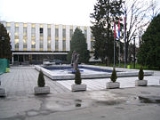
National Assembly of the Republika Srpska
Encyclopedia
The National Assembly of the Republika Srpska (Serbian
: Народна скупштина Републике Српске / Narodna skupština Republike Srpske) is the legislative body of the Republika Srpska
, one of two entities
comprising the state of Bosnia and Herzegovina
. The current assembly is the seventh since the founding of the entity.
Serbian language
Serbian is a form of Serbo-Croatian, a South Slavic language, spoken by Serbs in Serbia, Bosnia and Herzegovina, Montenegro, Croatia and neighbouring countries....
: Народна скупштина Републике Српске / Narodna skupština Republike Srpske) is the legislative body of the Republika Srpska
Republika Srpska
Republika Srpska is one of two main political entities of Bosnia and Herzegovina, the other being the Federation of Bosnia and Herzegovina...
, one of two entities
Political divisions of Bosnia and Herzegovina
The political divisions of Bosnia and Herzegovina were created by the Dayton Agreement, which recognized a second tier of government in Bosnia and Herzegovina comprising two entities—a joint Federation of Bosnia and Herzegovina and the Republika Srpska -- each presiding over roughly one half of...
comprising the state of Bosnia and Herzegovina
Bosnia and Herzegovina
Bosnia and Herzegovina , sometimes called Bosnia-Herzegovina or simply Bosnia, is a country in Southern Europe, on the Balkan Peninsula. Bordered by Croatia to the north, west and south, Serbia to the east, and Montenegro to the southeast, Bosnia and Herzegovina is almost landlocked, except for the...
. The current assembly is the seventh since the founding of the entity.
History
- First Assembly (24 October 1991 to 14 September 1996)
- Second Assembly (19 October 1996 to 27 December 1997) (election of 4 September 1996)
- Third Assembly (27 December 1997 to 19 October 1998) (election of 14 September 1997)
- Fourth Assembly (19 October 1998 to 16 December 2000) (election of 13 September 1998)
- Fifth Assembly (16 December 2000 to 28 November 2002) (election of 11 September 2000)
- Sixth Assembly (28 November 2002 to 9 November 2006) (election of 5 October 2002)
- Seventh Assembly (from 9 November 2006) (election of 1 October 2006)
- Eighth Assembly (to be seated in November 2010) (election of 3 October 2010)
Current Composition
Total seats: 83- Alliance of Independent Social Democrats - 37
- Serbian Democratic Party - 18
- Party of Democratic ProgressParty of Democratic ProgressThe Party of Democratic Progress is a Serbian political party in Bosnia and Herzegovina. It is the third-largest party in Republika Srpska.-History:...
- 7 - Democratic People's AllianceDemocratic People's AllianceThe Democratic People's Alliance is a political party in Republic of Srpska and Bosnia and Herzegovina.At the last legislative elections in Republic of Srpska and Bosnia and Herzegovina, 5 October 2002, the party won seats in the House of Representatives of Bosnia and Herzegovina, and 3 out of 83...
- 6 - Socialist Party - 4
- Social Democratic Party of Bosnia and HerzegovinaSocial Democratic Party of Bosnia and HerzegovinaThe Social Democratic Party of Bosnia and Herzegovina is a multi-ethnic social-democratic political party in Bosnia and Herzegovina.The party is the successor of the League of Communists of Bosnia and Herzegovina, and was enlarged by the inclusion of the Socijaldemokrati BiH party to the original...
- 3 - Democratic Party - 2
- National Democratic Party - 2
- Party of Democratic ActionParty of Democratic ActionThe Party of Democratic Action is a Bosniak national political party in Bosnia and Herzegovina.-History:The Party of Democratic Action was founded in May 1990 by Alija Izetbegović, representing the Bosnian Muslim population...
- 2 - Serbian Radical PartySerbian Radical Party of the Republika SrpskaThe Serbian Radical Party of the Republika Srpska is a Serbian ultra-nationalist political party in Bosnia and Herzegovina....
- 1 - IndependentIndependent (politician)In politics, an independent or non-party politician is an individual not affiliated to any political party. Independents may hold a centrist viewpoint between those of major political parties, a viewpoint more extreme than any major party, or they may have a viewpoint based on issues that they do...
- 1

